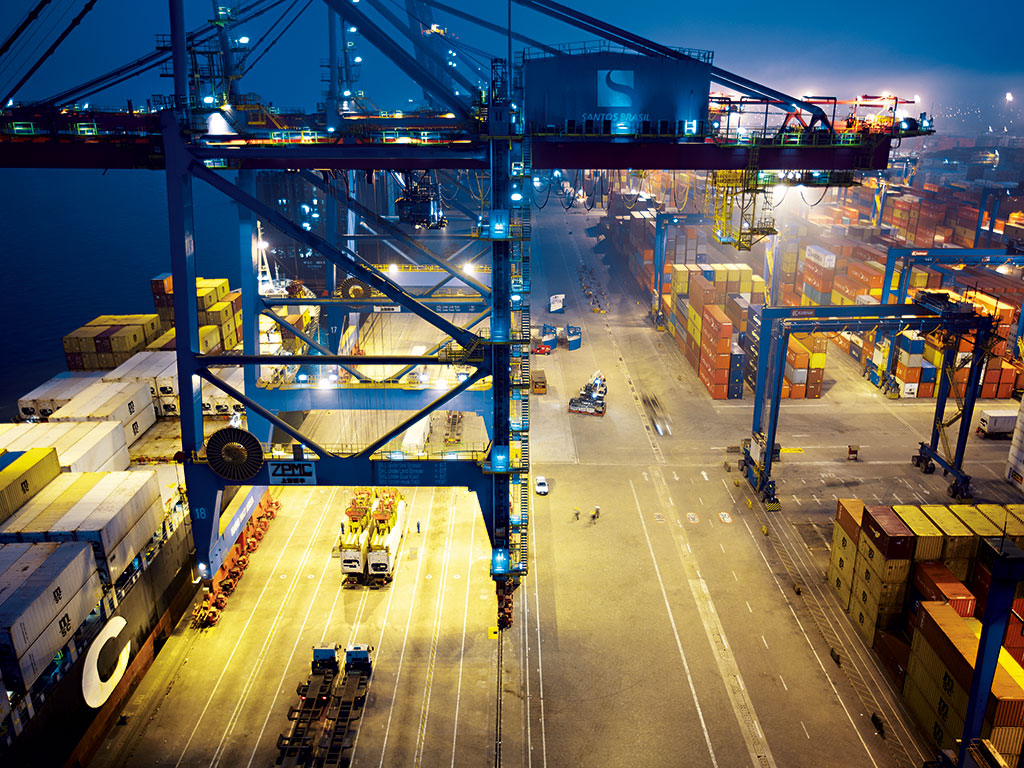admin
KPT faces slow pace of work due to strike
Reported by: `Mubeen Hussain December 29, 2016
KPT faces slow pace of work due to strike
KARACHI: The Karachi Port Trust (KPT) is facing slow pace of work after labourers of the Karachi Dock Labor Board declared a strike named “go slow” for the acceptance of their demands.
According to sources, the “go slow” strike is causing demurrage worth millions of rupees to the importers as the cargo vessels are being berthed at the port very late due to slow pace of work.
The Dock Labor Board is protesting because the labourers have been restricted from working at under-construction Pakistan Deep Water Container Port (PDWCP). The port is being built under the supervision of the Chinese workers, informed the source.
The source also said that the Karachi Port Trust (KPT) authorities are in talks with the labourers to sort out the issue but the protesters have rejected any discussion until their demands are fulfilled.
The source also revealed that due to the strike, more than five general cargo containers as well as oil vessels are still not berthed and kept off the port area.
Authorities are optimistic that the ongoing strike will end soon because this strike is putting negative impact on the national economy.
Hamburg Sud deal likely to force Maersk sale of Brazilian subsidiary
Maersk Line’s acquisition of Hamburg Sud will likely force it to sell its Brazilian flag operation Mercosul Line, which could open the door to CMA CGM or Mediterranean Shipping Co. to enter the closed Brazilian coastal shipping market.
Hamburg Sud has its own ECSA cabotage and feeder subsidiary, Alianca Navegacao, and if Maersk were to gain control of that subsidiary as well as Mercosul, it would control 80 percent of the ECSA coastal market, something the Brazilian competition regulator Conselho Administrativo de Defesa Economica, or CADE, would not allow.
“If they (Alianca and Mercosul) try to merge there will be problems with CADE. I think that Maersk will have to sell off one of these services and so the logical one to sell is Mercosul Line,” said Luis Resano, the executive vice president of the Brazilian Flag Shipowners Association. “Other shipping lines have shown an interest in entering the Brazilian cabotage market in the past.”
Mercosul Line operates three container ships that each have a capacity of 2,500 TEUs and runs a joint service with the sole Brazilian-owned box carrier, Log-In Logistica.
Alianca has 11 vessels of various sizes and controls more than 60 percent of the ECSA market, which is estimated at more than 800,000 twenty-foot-equivalent units annually.
Allowing Mercosul and Alianca to merge would threaten Log-In because the company has the oldest fleet in the coastal trades and has been struggling to turn a profit in recent years. Without Mercosul Line as a partner to offer the weekly service demanded by the market, Log-In’s future would be in doubt.
For example, without Mercosul, Log-In would certainly have to end its jointly operated Brazil-Argentina connection. Sling 1 of that service covers seven ports from the jungle port of Manaus to Itajai in the south of Brazil, while Sling 2 calls at seven ports from Fortaleza in the northeast of Brazil to Buenos Aires in Argentina.
JOC.com can confirm that CADE and Maersk officials have been in contact already, but “there is still a long way to go,” to figure out how to resolve the competition concerns.
CMA CGM is one possible buyer for Mercosul. It is well known in Brazil the French carrier has been trying to enter the Brazilian cabotage trade, possibly by buying some small Brazilian flag container ships, but it is very rare that any become available.
Gwadar port to be operational by year end: Chinese official
GWADAR: The multi-million dollar Gwadar port is set to be at “full operation” by the end of the year, a Chinese official said Tuesday, part of Beijing’s ambitious economic plans in the region.
Gwadar port will see roughly one million tonnes of cargo going through it by 2017, said Zhang Baozhong, chairman of the company in charge of development, the China Overseas Ports Holding Company.
Current trade there is “basically nothing”, he told reporters on the sidelines of a seminar about the port’s development Tuesday.
“We hope a big jump will take place… Our dream is to make Gwadar a regional trading centre,” he said.
Gwadar forms what officials call the “heart” of the China Pakistan Economic Corridor, a grand $46 billion project giving Beijing greater access to the Middle East, Africa and Europe through Pakistan.
The port was built in 2007 with technical help from Beijing as well as Chinese financial assistance of about $248 million.
Zhang said the tonnage will initially comprise “quite a number” of construction materials for the city’s development, which Pakistani officials envision turning into another Dubai.
Exports will at first focus on the local fishing industry, he said, with a modern processing plant planned for the area, though he would not give a timeline for the plant.
“We shall try to process it here… So that the locals can benefit,” he told reporters after the seminar.
Desperately poor Balochistan has been roiled since 2004 by a separatist insurgency aimed at seeking greater control over the province’s resources.
Locals have accused the Chinese of conspiring with the elite to plunder the province while doing little to share profits and create jobs for residents.
KP demand for excise duty on crude production opposed
ISLAMABAD: Amid fixing of borrowing limits on provincial governments at Rs112 billion per annum, the Federal Board of Revenue (FBR) on Wednesday opposed a demand from the Khyber Pakhtunkhwa to impose excise duty on local crude production, saying this will increase petroleum prices across the country.
Shahid Hassan Assad, Member FBR, told the Senate Standing Committee on Finance and Revenue that the KP government had requested the federal government to impose federal excise duty (FED) on oil produced in the province.
He, however, said the FBR was opposed to the proposal given the fact that this FED would then be required to be extended to other provinces and on import of crude from abroad for the purpose of uniformity which would increase the prices of petroleum products.
He said the provincial government wanted to have proceeds of the FED under article 161 (1) (b) of the Constitution that said the net proceeds of the FED on oil levied at wellhead and collected by the federal government shall not form part of the federal consolidated fund and shall be paid to the provinces in which the wellhead of oil is situated.
Responding to a question from chairman of the committee Senator Salim Mandviwalla, Mr Assad said the FBR was only a collecting agency and if imposed, it would have to transfer the FED to the province after collection.
It appeared there was another reason behind FBR’s opposition to KP demand. The FBR member said the KP government had argued that downward adjustment in taxes on petroleum products should be made on taxes collected by the federal government like Petroleum Development Levy if it did not want to impact the prices.
The committee decided to have a hearing from the provincial government as well before finalising its recommendation.
The committee was also informed that the National Economic Council had approved limits for all the provincial governments to contract domestic borrowing which should not go beyond 0.5 per cent of GDP.
A representative of the Ministry of Finance told the committee that provinces could negotiate external loans but these have to pass through the Economic Affairs Division and appear on the federal government accounts. The provinces could not on their own secure international loans.
It was informed that debt borrowing limit from domestic sources was worked out at Rs153bn for the current year which actually came down to Rs112.59bn after accounting for federal adjustments.
As such, the Punjab government could borrow up to Rs61.75bn, followed by Sindh at Rs20.05bn. KP and Balochistan have the powers to borrow up to Rs16.88bn and Rs13.91bn, respectively.
Lower oil prices unlikely to lure Japanese utilities away from LNG: Eclipse
Recent falls in global oil prices were unlikely to prompt the switch from LNG to oil by Japanese power utilities seen earlier this year as LNG spot prices were this time likely to remain competitive, Eclipse Energy said this week.
According to Eclipse, a natural gas analytics and forecasting unit of Platts, the trigger point for utilities to turn off their least efficient gas-fired units and restart high efficiency oil-fired units is around $8.30/MMBtu for October, $8.41/MMBtu for November and $8.51/MMBtu for December.
The Platts JKM for cargoes for delivery in October was assessed at $7.85/MMBtu Tuesday, more than 40 cents lower than the potential switching threshold.
JKM swaps for November were assessed at $7.70/MMBtu and for December at $7.75/MMBtu.
The contango structure heading into winter was slight as additional supply from new Asian LNG projects poised to come online soon was putting some downward pressure on prices, which were expected to remain competitive throughout the coming winter, sources said.
However, a North Asian utility source said fuel switching could occur at some older, less efficient gas-fired plants. “It’s all about economics; studying which units are cheaper,” he added.
Several Japanese power utilities switched to oil from LNG over December- January when global oil prices fell sharply, but the trend was short-lived.
Crude and fuel oil have been falling out of favor for power generation in Japan as the country’s oil-fired plants are generally outdated and inefficient.
Higher oil prices prior to the recent decline and growing environmental awareness have also discouraged their use.
Japan’s 10 major power utilities consumed 100,251 b/d of crude oil over April-July, down 18% from the same period a year earlier, Federation of Electric Power Companies of Japan data showed.
The use of fuel oil fell 5% over the same period to 144,847 b/d.




